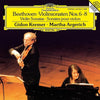



Ludwig van Beethoven - Violin Sonatas 6-8 - Gidon Kremer & Martha Argerich (2LP 3 Sides, Digital Recording)
Ludwig van Beethoven - Sonatas for piano and violin Nos. 6–8
Violin - Gidon Kremer
Piano - Martha Argerich
2LP, standard sleeve
Original analog Master tape : NO (Digital Recording Original Master Tape)
Heavy Press : 180g Virgin Vinyl
Record color : Black
Speed : 33RPM
Size : 12'’
Stereo
Studio
Record Press : Optimal Media GmbH in Germany
Label : Analogphonic
Original label : Deutsche Grammophon
Original Label : Deutsche Grammophon
Recorded in Montreux, Auditorium Stravinski, December 1993
Engineered by Gregor Zielinsky
Produced by Wolfgang Stengel
Mastered by Rainer Maillard at Emil Berliner Studios
Photography by Klaus Rudolph
Originally released in November 1994
Reissued in 2014
Tracks :
Side A: SONATE A-DUR, OP.30 NR.1:
1. Allegro
2. Adagio molto espressivo
3. Allegretto con Variazioni (I—VI)
Side B: - SONATE C-MOLL, OP. 30 NR. 2:
1. Allegro con brio
2. Adagio cantabile
3. Scherzo. Allegro
4. Finale. Allegro — Presto
Side C:
1. Allegro assai
2. Tempo di Minuetto, ma molto moderato e grazioso
3. Allegro vivace
Reviews:
"Beethoven’s ten violin sonatas span the period from 1797-1812, and the G major work ending the series (which he evidently revised prior to its publication in 1816) came as long after the Kreutzer as the difference in opus numbers suggests – the nine intervening years saw the appearance of Symphonies Nos. 4-8 and much else. Stylistically, this last sonata looks forward to his third period and its lyricism differs markedly from the fire of its predecessor, while the other eight are youthfully confident; it is perhaps significant that only two of the whole series are in a minor key.
Kremer and Argerich understand the bright buoyancy of the Op. 12 triptych, in which the music flows along crisply yet flexibly, with brisk tempos and sharply defined dynamics: there is charm here as well as the necessary energy. I confess to longstanding slight reservations about this violinist’s sweet yet wiry tone and the way he sometimes shapes and shades a phrase; but make no mistake, he is totally assured and his partnership with the equally authoritative Argerich offers much to admire and enjoy. The finale of the First Sonata, a dancing rondo in 6/8, shows their boldness and bounce to advantage – and the same is true of the witty first movement of No. 2, in the same metre but more teasing in character. Slow movements, sometimes in variation form, also characteristically speak with elegance and eloquence while scherzos have point and vitality. This latter characteristic also marks the Presto first movement of the A minor Sonata, No. 4, unusually vigorous here, with Argerich in tigerish mood. Though this duo mostly know when to persuade and relax, with such strong players the interpretative temperature is inevitably on the high side.
However, I’ll pen a cautionary word about the extremely free delivery of the opening bars of the Spring Sonata (No. 5). Indeed, with the duo’s performance of this piece self-conscious romanticism suddenly and disconcertingly rears its head and the central Adagio molto espressivo tends to be self-indulgent. The opening Allegro of No. 6 is deliberate in pace and didactic in manner, though it holds the attention, and the Adagio that follows saunters along at four quaver beats to the bar where Beethoven asks for two crotchets and thus a greater sense of flow. The vivid first movement of No. 8 in G major, though exhilarating, could be more playful, but its quirky, overlong Minuet moves well enough. In its predecessor, the duo give us the right minor mode force and drama, and these qualities also inform the Kreutzer, which receives a performance of great authority even if one looks for more simplicity in the central set of variations. The final G major Sonata is all of a piece with the rest of this set and perhaps admirable on its own terms, but I like it to flow more naturally and gracefully, and in the Scherzo the artists treat the sforzando-piano markings as heavy accents.
For performances of gentler and richer humanity, though not wanting in brilliance, I prefer Perlman and Ashkenazy, finely recorded in the 1970s, but note that, while at mid price, they take four discs instead of the three the present duo achieve by altering the order of the sonatas. Clear recording, though at forte and above the piano is on the reverberant side." Gramophone
Ratings:
Discogs : 3.88 / 5



